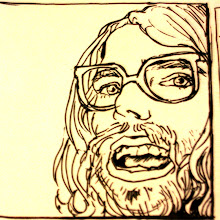I'm an atheist. A flaming, out of the closet atheist. Lately, I've noticed a trend among religious folks toward referring to atheism as "fundamentalism," and, to be honest, I would probably laugh in the face of anyone who called me any sort of fundamentalist if they didn't all mean it so hard.
Frankly, I don't care what you believe. I'm all for your right to believe it, but I don't care what
it is. I respect your ability to live a full, happy life however you see fit. I think I speak for a lot of atheists when I say this. It's in our best interest to support religious freedom, too. Unfortunately, we often don't have the same courtesy extended to us. While most of us are perfectly okay with you worshiping your god in whatever way you see fit, atheists are commonly seen as a "problem." As if we're somehow incapable of developing a moral grounding for ourselves without religion. As if somehow, the good we do isn't good because it's not in the name of a god. Personally, I'd say this point is not even worth addressing; if I can't speak with the authority of "god," I won't be changing any minds anyway. Moving on now...
I resent being called a fundamentalist by the sorts of people who want to keep us down in society based on their own religious fundamentalism. What this betrays to me is a huge lack of understanding of fundamentalism on the part of the accuser. Fundamentalism is an extreme adherence to a set of principles or a religion or pretty much anything, really. And for atheists, that's simply not there. Our disbelief in gods doesn't come from any specific place. Almost all of us arrived at the conclusion that there is no such thing as a god on our own, through different thought processes. We don't proselytize. We do often engage in debates, but they tend to be on more specific issues (such as evolution), rather than whether there is or isn't a god. No one is "converted" to atheism by missionaries going door to door or putting on events at a church. On top of that, the way we see the world changes with the data. We don't have an infallible text on anything. Even Darwinian evolution as outlined in
The Origin of Species is not really accepted as the whole, official story, just like Galileo didn't contribute the entire body of modern astronomical knowledge. Atheism comes more from a recognition of our profound ignorance rather than from any sort of know-it-all mentality. We are well aware that we don't know everything, and we're also well aware that just jamming "god" in the place of things we just don't know is lazy and counterproductive when it comes to actually learning about those things.
Further distancing atheists from fundamentalists are our goals and the forms our activism takes. We don't want atheism to be the "national religion" (unlike people who refuse to let go of the idea that we're a "Christian nation" - based on very questionable evidence). We just don't
want a national religion. We don't want god on our money or in our pledge of allegiance because we don't believe in a god and therefore, don't wish to pledge our allegiance to one. We don't want our tax money going toward monuments with religious symbolism on them. This is not because we want an "atheist" nation. It's because our constitution guarantees us the right to live in a country where we aren't assumed or expected to follow a particular religion. And to do that, there are two options: either we officially recognize every religion as our national religion, everything, no matter how far-fetched, on equal footing with everything else, or we keep the government and religion separate from each other. I like the latter option better. I wouldn't put my money in a collection plate, and I don't want the government to put my money in a collection plate, either. We're all okay with
you putting
your money in a collection plate, and conducting religious activities in ways that don't infringe on the rights of others, but apparently, our not wanting any part of it makes us "fundamentalists." In reality, we want a government that makes its decisions based on the facts available on any given issue, without those facts being "influenced" by religious belief in potentially harmful ways.
And the form our activism typically takes? Well, we don't kill people. We don't strap bombs to ourselves. We don't use tax-exempt organizations for sketchy purposes. We're not fighting any wars over "holy" lands. Typically we engage in debates, increase interest and educate people about science, raise awareness of the issues atheists face, stand up for the continued separation of church and state, and most importantly, come out as atheists publicly to encourage other people to do the same and quit being ashamed of their lack of belief.
Which, really, is not a very fundamentalist way of going about things, is it?




